
Open Access is an international movement that uses the Internet to unlock the doors that once hidden knowledge. The Open Access movement is gaining ever more momentum around the world. Many research funders and policy makers now require the unrestricted sharing of research results.
Open Access Week is a global event, now in its 15th year, promoting Open Access as a new norm in scholarship and research.

The theme for 2022, Open for Climate Justice, in line with UNESCO Recommendation on Open Science, focuses on the importance of equity in pursuing a future for climate justice that is open by default






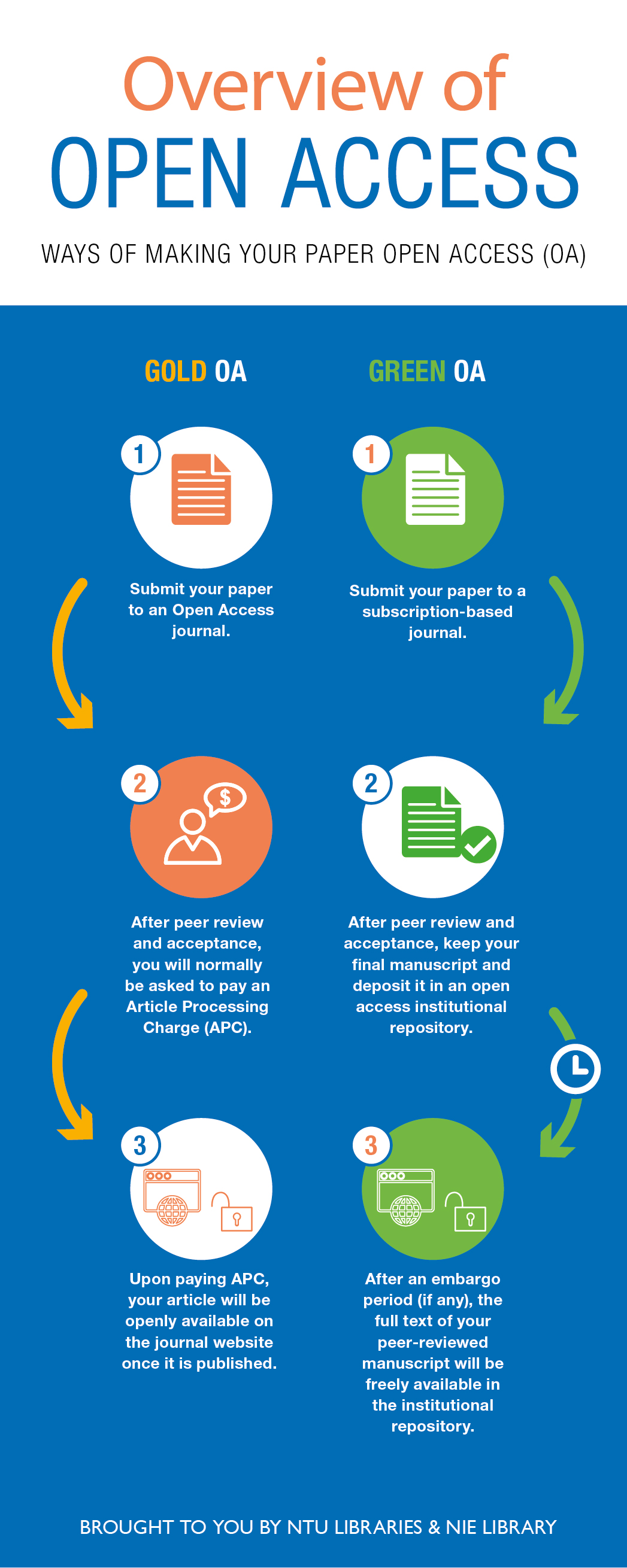
FAQs
1. Can I make my papers OA without paying APC?
Yes, most publishers allow your peer-reviewed final manuscript to be made openly available via your institutional repository. Your librarian will check the publishers’ policy and ensure that your submission is copyright compliant. Submission Procedures: NTU & NIE
2. Can I still deposit papers that are under a “publisher’s embargo”?
Yes, you can still submit your accepted manuscript as soon as it is ready. The system allows us to lock the full text access of a submission by setting an embargo period. Your librarian will also check and ensure that the full text of the manuscript will only be made openly available after the publishers’ embargo period.
3. How can I identify and avoid questionable OA journals?
One, check the list of questionable journals and publishers provided by Jeff Beall (http://scholarlyoa.com/publishers). Note that some people have criticised Beall and the partiality of his list.
Two, check if the OA journal you intend to publish in is listed in the Directory of Open Access Journals (DOAJ) (https://doaj.org/). DOAJ uses a set of strict criteria for journals to get in and to stay on its list.
Three, thoroughly analyse the journal itself and use the simple checklist developed by Think.Check.Submit (http://thinkchecksubmit.org) to help you clarify and assess if a particular journal is a good choice.
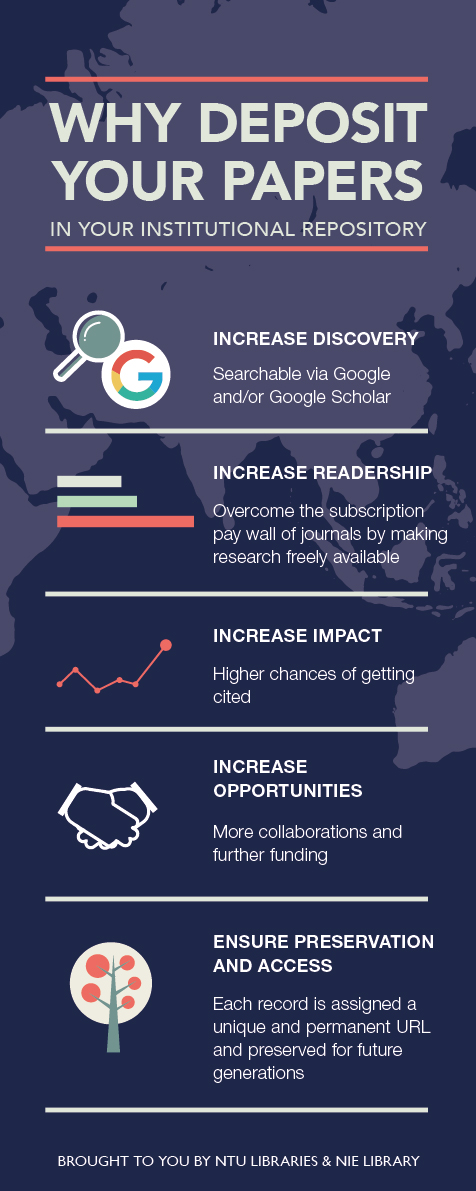
FAQs
1. I have published my paper in an Open Access (OA) journal. Do I have to deposit it in an institutional repository?
Yes, you will have easy and convenient access to all your papers published while in service to your institution. Yon can also insert the unique URLs of each item record (of articles published in OA journals, as well as in hybrid journals or subscription-based journals) to the citations in your own website or staff profile page so that other academics or students can easily access the full text. The underlying goal of an institutional repository is to preserve and increase the visibility and accessibility of the institutional's collective research output in one central location.
2. Am I allowed to deposit papers already published in OA journals?
Yes, however unless expressly stated in the journal’s self-archival policy or it is known that the article is published under a Creative Commons licence, we will still need to check that permission is granted by publishers to deposit the published works in the repository.
3. Can I make my papers OA without publishing in OA journals?
Yes, you can publish in a subscription journal as usual, and later submit your peer-reviewed final manuscript to be made openly available via your institutional repository. Your librarian will check the publishers’ policy and ensure that your submission is copyright compliant. Submission Procedures: NTU & NIE
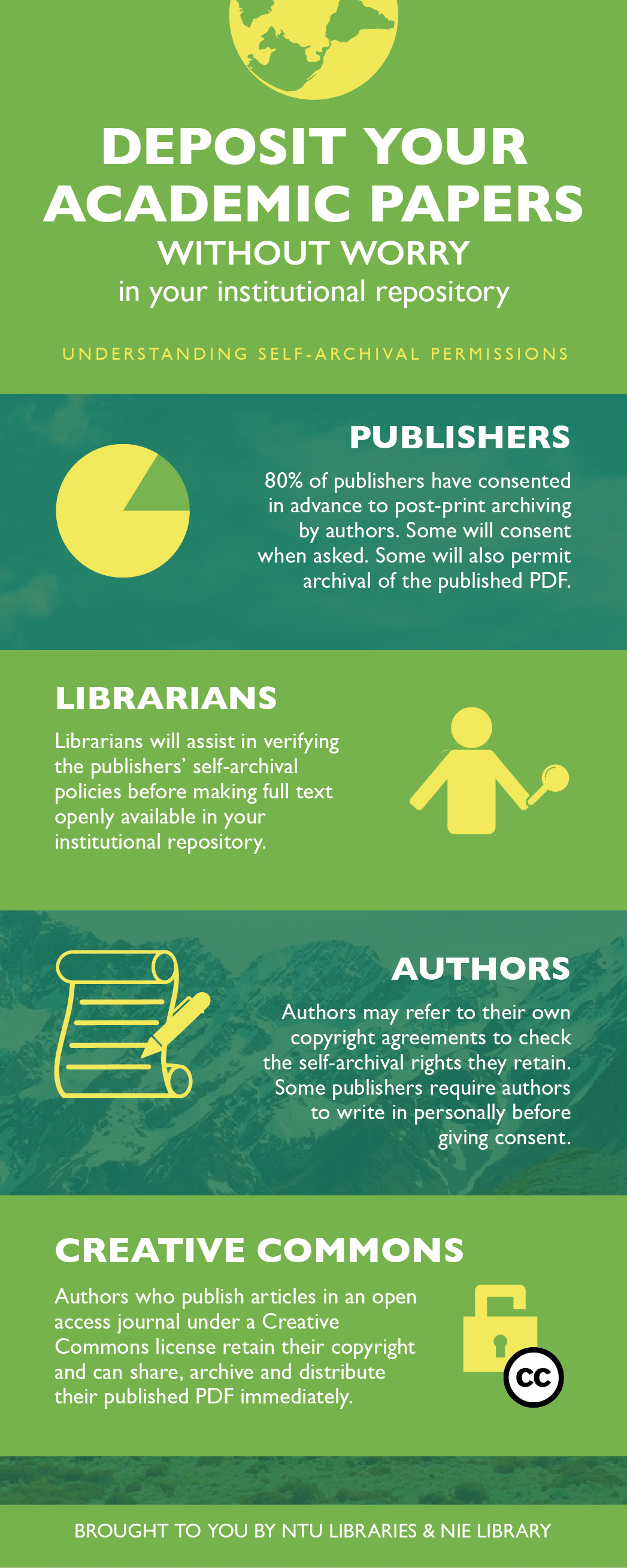
FAQs
1. Where I can check the self-archival policies of different publishers or journals?
You may refer to the SHERPA/ROMEO website (http://www.sherpa.ac.uk/romeo.php ) for journal/publisher policies. Some policies are not available in the SHERPA/ROMEO website, but are located in the publisher’s official website. When in doubt or when information is not available, always submit the Author’s post-print (or accepted manuscript) to the library instead of the published PDF.
2. Can I archive the final published PDF instead of the Author’s post-print (or accepted manuscript)?
Yes, some publishers do allow libraries to make their final published PDF freely available online (usually open access publishers), but most publishers only permit the Author’s post-print (or accepted manuscript) to be archived; however this version’s content is very close to the final published version. Wherever publisher agreements allow, the library will deposit the final published PDF instead of the Author’s post-print (or accepted manuscript).
3. I do not have time to check the publisher’s policy, can I still submit my papers in the institutional repository?
Yes, simply follow one of the methods (in NTU or NIE) to deposit your peer-reviewed manuscript (which incorporates referees’ comments) into your institutional repository . Your librarian will check the publisher’s policy and ensure that the publisher permits the full text archival.
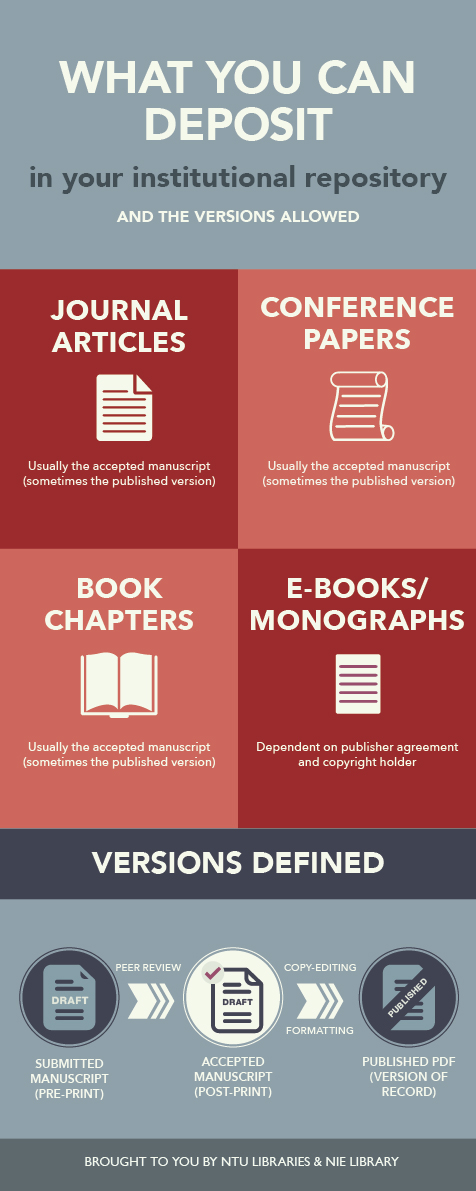
FAQs
1. Is the proof or off-print the same as the post-print version?
No, unlike post-prints which are produced by the author, proofs and offprints are delivered to the author from the publisher. Proofs and offprints have been formatted and reflect any layout or copyediting done by the publisher in preparation for publication. Proofs and offprints should not be deposited in institutional repositories.
2. How can I find out more about managing and sharing research data?
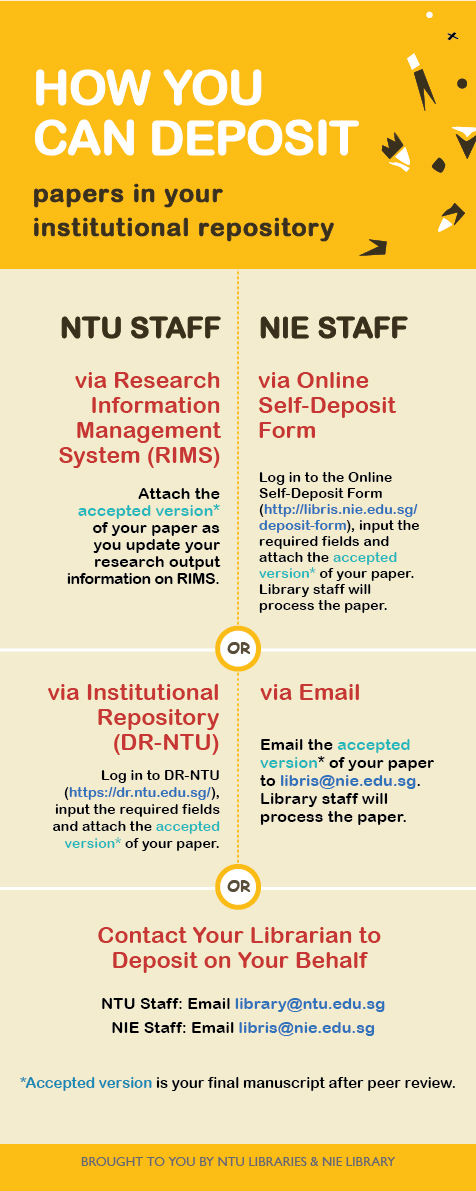
FAQs
1. How fast does it take to process my papers and upload them?
On average, once the full text has been submitted, the processing by the librarian takes 1-2 weeks. The metadata (i.e. citation details) will be publicly available and indexed in Google (and sometimes Google Scholar) soon after. However, for papers that are under embargo, the link to the full text will only be accessible after the appropriate embargo period has been observed.
2. Can I archive my papers in ResearchGate and Academia.edu?
Some publishers encourages sharing in institutional repositories, non-commercial subject repositories or personal websites, but specifically forbids sharing in for-profit commercial repositories and social networking sites such as ResearchGate and Academia.edu. So where such policies are in place, you may be in danger of violating these terms of service if you post an article on a social networking site. However, do check the self-archival policies of individual publishers in the SHERPA/ROMEO website to check which versions of an article are allowed to be deposited, and if a time delay (embargo) is required. For more information, check out this guide on the differences between social networking sites and your institutional repository.
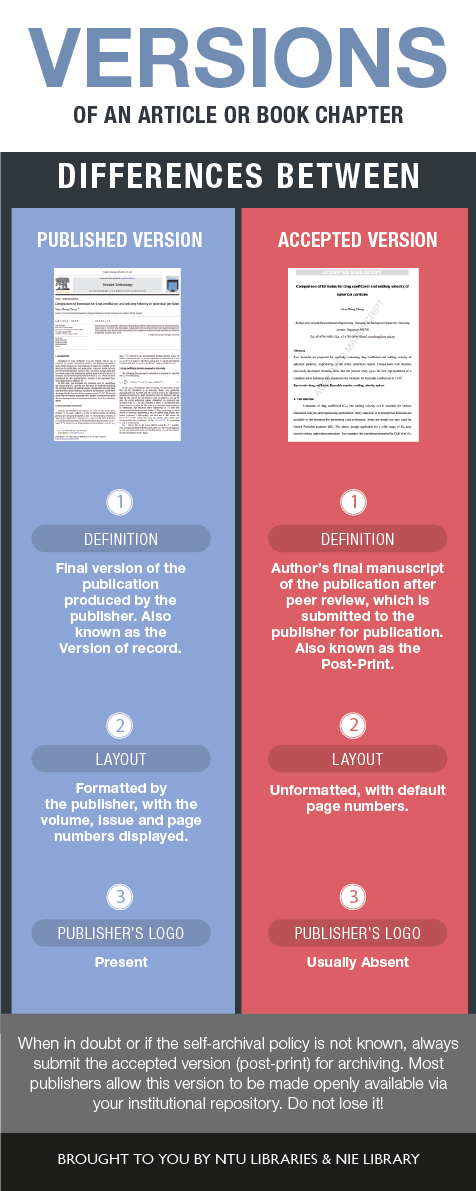
FAQs
1. Can I archive the final published PDF instead of the Author’s post-print (or accepted manuscript)?
Yes, some publishers do allow libraries to make their final published PDF freely available online (usually open access publishers), but most publishers only permit the Author’s post-print (or accepted manuscript) to be archived; however this version’s content is very close to the final published version. Wherever publisher agreements allow, the library will deposit the final published PDF instead of the Author’s post-print (or accepted manuscript).
2. Is the proof or off-print the same as the post-print version?
No, unlike post-prints which are produced by the author, proofs and offprints are delivered to the author from the publisher. Proofs and offprints have been formatted and reflect any layout or copyediting done by the publisher in preparation for publication. Proofs and offprints should not be deposited in institutional repositories.